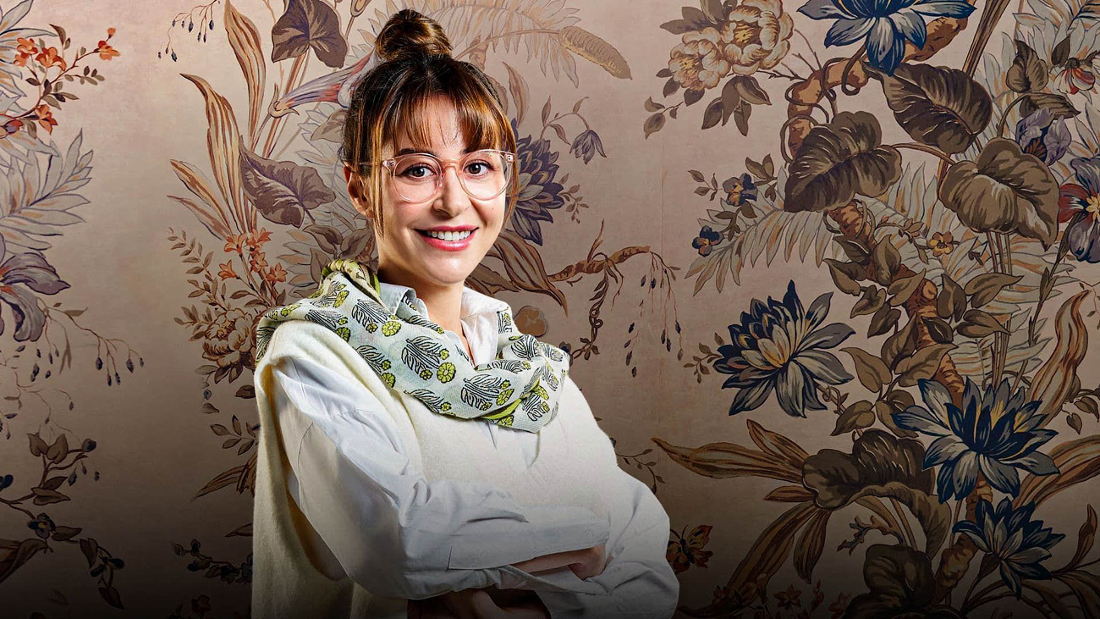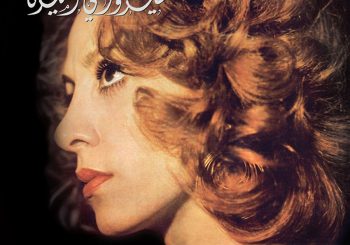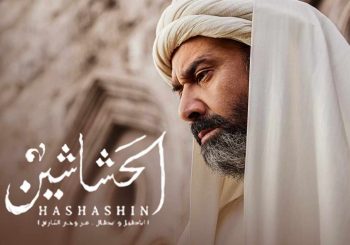Every year during Ramadan, dozens of television series compete for the attention of millions who follow them eagerly and engage in passionate social media debates about their plotlines and artistic merits.
As the holy month comes to a close, audiences have decided which of the season’s most anticipated shows were worth the hype, and which ones fell short. One show whose standing remains ambiguous, however, is the Egyptian series Taghyeer Gaw (Change of Scenery).
Directed by Mariam Abou Ouf and written by Mona El-Shimi and Magdy Amin, the show follows Sherifa (Menna Shalaby)’s attempt to sell the family home to pay for her mother (Sherine)’s rehab, as the latter struggles with addiction.
Legal complications take Sherifa to Beirut, where her aunt Aziza, or ‘Zouzou,’ (Mervat Amin) runs a cozy bed and breakfast. When the handbag containing Sherifa’s passport and legal documents is stolen, the short visit stretches into a long journey marked by both mishappenings and life-changing encounters.
Unlike most works belonging to the Ramadan serial genre, Taghyeer Gaw features neither complex storylines, nor explicit social commentary, opting instead to let viewers make their own judgments about the slice of life it portrays.
Since its release on 7 April, the show has been at the receiving end of high praise, and equally, sharp criticism – prompting debate about what makes a good Ramadan series.
Representation of Egyptians Living Abroad
One of Taghyeer Gaw’s core themes is immigration: throughout the series, the protagonist and viewers meet different examples of Egyptians living abroad.
Sherifa’s aunt Zouzou is a successful business owner, whose daughter and husband lead a comfortable life in the bed and breakfast she runs. Khaled (Eyad Nassar) is a university professor raising a teenage daughter on his own, also seeming to fare well despite Lebanon’s economic crisis, to which the show makes direct reference.
Meanwhile, Ayman (Essam Omar), works alongside fellow Egyptian migrants at a gas station and leads a much more modest lifestyle. The show’s characters mirror the varying fates of Egyptians who leave their home country for better opportunities abroad.
The absence of overt commentary or judgment about these divergent circumstances makes room for viewers to form their own interpretations, which many took to social media to discuss.
On the one hand, a number of users praised the show for its honest portrayal of Egyptian migrants’ struggles to adapt to the cultures of their host countries, or the racism that migrants often face.
صحابي المصريين اللي عايشين في تونس بقوا بيدخلوا كلام تونسي في وسط كلامهم ودا شئ كان بيزعجني فشخ، عشان يعني باين إنهم مصريين وبتكلموا تونسي غلط أصلا، تونسي بالمصري 😅
عصام عمر في مسلسل تغيير جو بيتكلم لبناني بالمصري برضه زي صحابي دول
براڤو عصام عمر ع التفصيلة الحقيقية دي— Joe Goldberg (@f_elzahr2a) April 11, 2023
Translation: My Egyptian friends who live in Tunisia have started to use Tunisian words in the middle of their sentences, and this used to really bother me because they would misuse and “Egyptianize” them. In Taghyeer Gaw, Essam Omar also speaks Lebanese dialect in an Egyptian accent. Props to him for this authentic detail!
في فكرة قليل ما حدا ركز عليها في #تغيير_جو.. العمل بيحكي عن العنصرية بأكتر من مطرح وبعيداً عن قصة منة شلبي.. لما بتطلب عزيزة من عم عز يوقف عالباب لانه بشرته سمرا، ابنتها بترفض هالشي وتوصلها بالعنصرية..
لما أيمن بقلها لأنيسة انتوا غير نحن وما بيقبل يشتغل متلها حتى لو بقي بلا شغل.— Caroline Bazzi (@BazziCaroline) April 16, 2023
Translation: Besides Sherifa’s story, Taghyeer Gaw tackles racism in many ways. When Aziza asks [one waiter] to stand outside the restaurant because he is dark-skinned, her daughter opposes this and calls her racist. Ayman also tells [an Ethiopian cleaner at the gas station] that he would never accept her job, because [Egyptians] are not like [Ethiopians].
One storyline, however, where Ayman tries to extort money from Sherifa after finding her stolen bag, was seen by some users like the below to provide a negative image of Egyptians.
#تغيير_جو
يعني المخرجة مريم ابو عوف و الاستاذ المؤلف مجدي امين و معاه مني الشيمي مطلعين شخصيات لبنانية اخلاقهم عالية و جدعان جدا و شخصيات من المصريين اندال و استغلالين !!.. لأ بقي المصريين جدعان أوي ..ايه الفجاجة دي و القرف ده .. عيب بجد علي المخرجة و السادة المؤلفين— Yasmin Mohamed ياسمين محمد (@YasminM24315838) April 19, 2023
Translation: Director Mariam Abou Ouf, along with writers Magdy Amin and Mona El-Shimy, showed Lebanese people as decent and morally upstanding people, while making Egyptians out to be dishonest and exploitative… That’s not true, Egyptians are very good people. This is unacceptable.. Shame on the director and writers!
Other aspects of the show’s portrayal of Egyptian immigration to Lebanon were also deemed by some as unrealistic, such as the characters’ use of local dialect or the fact that low-income Egyptians would choose to leave their countries for equally harsh circumstances abroad.
اللي مستغربه في المسلسل دة هو ليه المصريين اللي شغالين في لبنان بيتكلموا لبناني https://t.co/NgukPKJdDm
— عبدالخالق (@Abdelkhaliik) April 12, 2023
Translation: Something I find weird about Taghyeer Gaw is that Egyptians working in Lebanon in the show speak the Lebanese dialect.
عندي سؤال في تغيير جو، ليه مصريين يهاجروا للبنان علشان يشتغلوا في بنزينة بجد؟!!!!
— bakry. (@youssef3hussein) April 10, 2023
Translation: I have a question about Taghyeer Gaw. Why would Egyptians go to Lebanon to work at a gas station? Seriously?!
Representation of single fatherhood and caregiving
Another one of the show’s main themes is caretaking in all its different forms. The source of Sherifa’s misadventures is her struggle to care for her sick mother, whose addiction makes her both financially and emotionally dependent on her daughter.
Zouzou and her daughter (Aida El Kashef) care for their disabled husband and father (Nabil Ali Maher), who is wheelchair-bound and cannot speak. Khaled is a single father caring for his teenage daughter and struggling to support her through the ups and downs of adolescence.
Here again, the show does not explicitly comment on these various characters’ struggles, small victories, or failures along the challenging journeys of caregiving – leaving viewers to form their own deeply mixed opinions about its representations.
On Twitter, several audience members voiced their delight with the show’s candid portrayal of caregiving relationships and the warmth uniting family members.
ميرڤت امين في #تغيير_جو طول الوقت بتكلم جوزها اللي مبيتكلمش و تشتكيله و تحكيله و تضحك معاه و تحب فيه .. الحوار فيه مزيج من اللذاذه و الطعامه و الحزن و الحب
— Elaria (@E_la_ria) April 13, 2023
Translation: In Taghyeer Gaw, Mervat Amin is always talking to her husband, who doesn’t speak. She tells him about her day, vents to him, tells him jokes, and spoils him… I find this aspect of the show so sweet and tasteful and sad but also so lovely.
انا حقيقي منبهرة بدور اياد نصار في مسلسل تغيير جو و ازاي حد ممكن يكون بابا جميل وحنين وبيحب ولاده كده
— مَرْيَم (@MariamSMoustaf1) April 10, 2023
Translation: I am absolutely in awe of Eyad Nassar’s role in Taghyeer Gaw! How can a father be so sweet, caring, and loving towards his children?
The show’s depiction of single fatherhood, however, was not uncontroversial, with the relationship between Khaled and his daughter described by some as unrealistic or reductive.
بنت إياد نصار في تغيير جو بتقول له جت لي البيريود، قال لها اطلبلك دكتور؟ 😂😂
دا تاني مشهد اشوفه في يومين لما يحبوا يقولوا إن الأب محتاس مع بنته من غير أم البنت دايما بتكون في سن البلوغ وبتجيلها البيريود في نفس الحلقة
قال يعني مفيش حاجة غير دي الرجالة بيعطلوا قدامها!— Joe Goldberg (@f_elzahr2a) April 10, 2023
Translation: Eyad Nassar’s daughter told him she got her period and his reaction was to ask if she needed a doctor? This is the second time this week that I’ve seen a show try to represent the challenges of single fatherhood with an [uncreative] scene like this one. As if this was the only thing men are clueless about!
بنت إياد نصار دي عايزه تتربى انا مشوفتش اب بيعمل كل ده والبنت طالعه كدا ايه ده
— Gamal (@gamalahmed3_) April 10, 2023
Translation: Eyad Nassar’s daughter needs to be raised all over again. I’ve never seen a daughter turn out like this when her father does so much for her.
Pacing and delivery
A recurring target of debate among viewers was the show’s pacing and delivery. While Ramadan series tend to pack as much action as possible into their fifteen-to-thirty episode windows, Taghyeer Gaw opted for a more leisurely pace and a focus on small, everyday events.
Several users praised the series’ artistic direction and the showrunners’ decision to break away from plot-heavy storytelling in favor of a refreshingly simple narrative.
مسلسل” تغيير جو ” بحسه اسم ع مُسمي خفيف ، لذيذ ، سلس وتشوفه اخر اليوم عشان بس تفصل بيه عن اي حاجة
— أماني ☘ (@AmanyMostafa188) April 18, 2023
Translation: Taghyeer Gaw is an aptly named show – smooth and simple. I like watching it at the end of the day to get my mind off of everything.
بقعد كل يوم أقرا الناس كاتبة إيه عن تغيير جو بعد الحلقة ولا كأني من فريق العمل، أحسن جملة قريتها لحد دلوقتي إنه عامل زي الطبخة الحلوة إللي بتتطبخ على نار هادية
— ; (@Faraahhh2) April 18, 2023
Translation: Every day, I read what people have to say about the latest episode of Tagheer Gaw. I’m as invested as if I were on the show’s team. The best description of it I’ve seen so far is that it’s like a delicious meal, heating over a low-burning fire.
Others, however, found that this slow-moving rhythm had failed to captivate audiences, or that the show would have worked better as a film, rather than stretched over fifteen episodes.
لما تعمل مسلسل قصير و برضو تطيح في نقطة الملل يعني عندك خلل كبير في الكتابه ..
العمل شدني و كان مشجع في الحلقه الاولى لكن من بعدها حرفياً ما تقدم ولا خطوه في الاربع حلقات اللي بعدها و اتمنى يتحسن الوضع في باقي الحلقات#تغيير_جو pic.twitter.com/lQudBCqWBS— اخو حلا ツ (@yazeed___4) April 11, 2023
Translation: When you create a short television series and somehow manage to elicit boredom, there’s a problem with the writing. In its first episode, the show intrigued me, but it literally took no steps forward in the next four episodes. I hope it gets better going forward.
تغيير جو ده كان ممكن يكون فيلم لطيف خفيف، يخلص في ساعة ونص مش ١٥ حلقة مفيهاش احداث.
— m3adel (@m3adel) April 13, 2023
Translation: Taghyeer Gaw could have been a nice, light film that ends in an hour and a half – not fifteen episodes where nothing happens.
Social messaging
Another point of contention was the series’ lack of a clear message, with many users openly pondering what the show is actually trying to say about mental health, immigration, or any of the important social issues it tackles.
On this point, some viewers read deeper social commentary between the lines of the show’s seemingly simple story, interpreting its everyday events as a metaphor for the ills of modern life.
“تغيير جو” دراما اجتماعية.جوقة لاتدفن عشقها لمهنة، لا تزال تشعل أفراحها.منة شلبي،ميرفت أمين،شيرين.روايةالغربة الداخلية، التوتر،الإدمان على المهدئات والكحول.الحياة الحديثةبين الستر والعري.إخراج مريم أبو عوف،يقوم على الإيقاع الحدثي والادائي،على مفهوم الوزن بالشعر.
— abido bacha (@AbidoBacha) April 11, 2023
Translation: Taghyeer Gaw is a social drama, a choir singing with passion for its profession, and igniting joy. Menna Shalaby, Mervat Amin, Sherine. A story of emotional alienation, anxiety, addiction to tranquilizers and alcohol. Modern life between reservedness and vulnerability. Mariam Abou Ouf expertly directs the show’s events and narrative rhythm.
Several users, like the below, however, found the series to be void of meaning or interest, with some even joking that its creators must have used it as a pretense for a relaxing trip to Beirut.
هو تغيير جو عايز يقول إيه بظبط؟
— Eman Selim (@EemSeleem) April 13, 2023
ناخد بالنا من شنطنا
— 🦹🏼♀️ (@Esss_123) April 13, 2023
Translation:
– What exactly is Taghyeer Gaw trying to say?
– That you should take care of your bag.
مسلسل تغيير جو ده ماهو فعلاً الا ان مجموعه ممثلين و مخرج قرروا يطلعوا لبنان يومين يغيروا جو علي حساب واحد منتج وخلاص اصل مالهاش تفسير تاني يعني بجد!!🤷🏻♀️😂🌚
— REEM ♐️🌻 (@DecemberQueen74) April 19, 2023
Translation: Tagheer gaw is the product of a group of actors and a director who decided to go to Lebanon for a change of scenery at the expense of a producer, nothing more. There’s really no other explanation!
Reflecting on this dichotomy, one Twitter user offered an alternative point of view. Taghyeer Gaw’s beauty, she suggested, lays precisely in its rejection of the expectation that Ramadan serials should aim to go beyond mere entertainment and instead, provide their viewers some life-changing message or perspective:
ليش مسلسل “تغيير جو” حلو؟ لأنو مش مدّعي. ما بيدّعي أي شي باستثناء تقديم قصة لذيذة، بكادرات حلوين، وبستوري لايت. عادي مش لازم كل المسلسلات يكون عندها رسائل وبدا تغير العالم وتصلح المجتمع. مسلسل رمضاني بيسلي، بأداء لذيذ.
— layal h (ليال حداد) (@layalhaddad) April 12, 2023
Translation: Why is Taghyeer Gaw such a good show? Because it doesn’t claim to be anything more. It doesn’t claim to do anything other than present a good story, with beautiful cinematography and lighting. Not all shows have to have a message. It’s an entertaining Ramadan serial, with a nice feel.
Speaking to CNN in May 2022, director Mariam Abou Ouf explained the ethos of authenticity and sincerity guiding her artistic projects, saying “I love stories about real people that are depicted with real feelings and all the details.”
In line with this vision, Taghyeer Gaw stands out for its devotion to portraying the lives of its characters in their seemingly mundane details, prompting viewers to look beyond the surface and build their own interpretations of these intimate moments.







Comment (1)
[…] post Why Egyptian Series Taghyeer Gaw Sparked Debate on Social Media first appeared on Egyptian […]